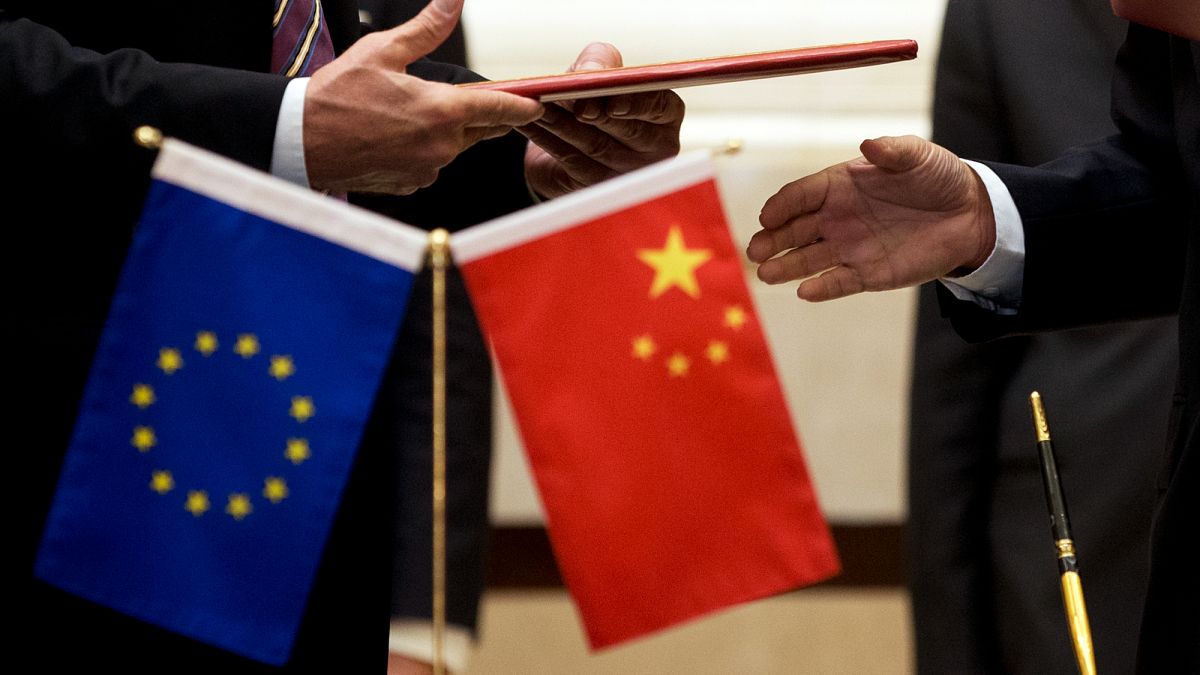By Euronews
Published on
Prospects for pragmatic China-EU cooperation remain broad, China’s head of EU mission has written in an exclusive op-ed for Euronews, published on the eve of a delicate summit of leaders taking place in Beijing on Thursday.
“European businesses are finding ample space to expand in the Chinese market,” according to Ambassador Cai Run, the head of the Chinese Mission to the EU, in an op-ed that lists a string of investment and cooperation relations.
In the piece, Cai trumpets that “brands such as BMW, Mercedes-Benz, and Volkswagen derive over 30% of their global sales from the Chinese market, with profits in China reaching up to 30 times those earned in their domestic markets.”
He claims that European products account for more than 30% and in some cases over 50% of China’s total imports in sectors such as chemicals, optics, aerospace and aviation.
Meanwhile Chinese corporate investment in Europe is listed at length. Cai namechecks the Pelješac Bridge project in Croatia; the Hungary-Serbia Railway, “China’s first high-speed rail project in Europe”, and Piraeus Port in Greece.
Of Piraeus, Cai claims in the op-ed that the project has created 4,300 direct local jobs and generated €1.4 billion in economic output, “accounting for approximately 1% of Greece’s GDP”.
Response to climate change is a unifying factor – Chinese envoy
Cai also touts cooperation through the China-EU Climate Change Partnership, saying China’s electric vehicle and new energy battery industries “have become key drivers of a new wave of investment in Europe, further strengthening the bonds of cooperation and injecting strong momentum into China-EU collaboration in the green and low-carbon sector.”
On research Cai says the Chinese government is prioritizing the EU as a key partner, and “remains committed to an open and innovation-driven policy, expanding international scientific and technological cooperation”.
He also hails the Geographic Indications (GI) Agreement as China’s “first comprehensive and high-level bilateral agreement on GI protection, marking a milestone in China-EU cooperation on intellectual property rights.”
Since its entry into force, he says, Zhouzhi kiwifruit and French champagne “have entered each other’s markets, helping preserve cultural and natural heritage and injecting new momentum into deeper China-EU collaboration.”
Despite the envoy’s optimistic tone, however, expectations for the outcome of Thursday’s summit are muted, despite its coinciding with the 50th anniversary of diplomatic relations between China and the EU.
Among the extensive list of friction points, two stand out: Beijing’s “no-limits” partnership with Moscow and the trade imbalances caused by industrial overcapacity.
In May, Chinese President Xi Jinping said the anniversary offered a chance to “properly handle frictions and differences, and open up a brighter future for China-EU relations”. Ursula von der Leyen, the president of the European Commission, and António Costa, the president of the European Council, played into the momentum and committed themselves to “deepening our partnership with China”.
But since then the tide has shifted.
Beijing’s decision to restrict the export of rare earths, the metallic elements that are crucial for manufacturing advanced technologies, caused widespread alarm across European industry and earned a rebuke from von der Leyen herself.
“China is using this quasi-monopoly not only as a bargaining chip, but also weaponising it to undermine competitors in key industries,” she said at the G7 summit in June.
“We all witnessed the cost and consequences of China’s coercion.”
Beijing immediately hit back against the Commission chief, calling her speech “baseless” and “biased”, but offered an olive branch to build a “win-win” partnership.
Read the full article here


